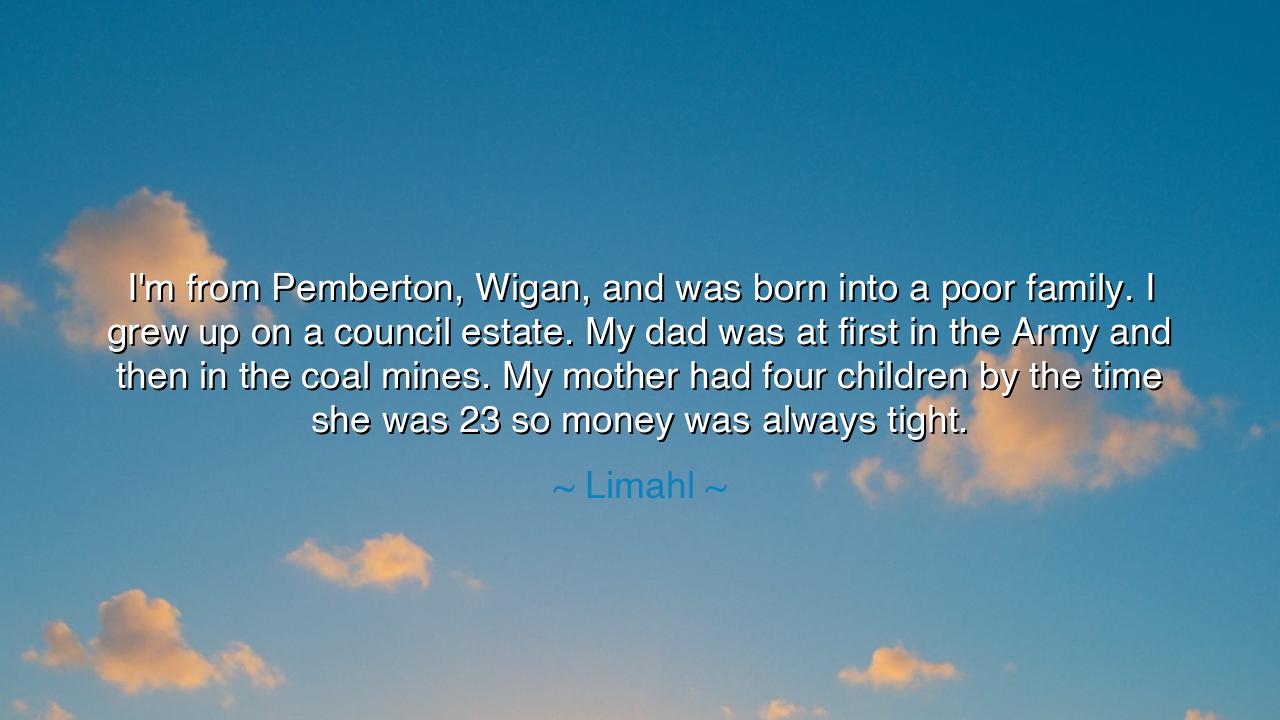
I'm from Pemberton, Wigan, and was born into a poor family. I
I'm from Pemberton, Wigan, and was born into a poor family. I grew up on a council estate. My dad was at first in the Army and then in the coal mines. My mother had four children by the time she was 23 so money was always tight.






“I’m from Pemberton, Wigan, and was born into a poor family. I grew up on a council estate. My dad was at first in the Army and then in the coal mines. My mother had four children by the time she was 23 so money was always tight.” — Limahl
In these humble and heartfelt words, Limahl, the pop icon of the 1980s, speaks not only of his beginnings, but of the timeless truth that greatness often rises from simplicity, and strength is born in struggle. His words echo with the sound of a world that knows hardship — the quiet dignity of working-class life, the resilience of those who build their dreams from the bare earth. To say “money was always tight” is not an admission of defeat, but the foundation of endurance. It is the soil in which character is sown, watered by necessity and hardened by reality.
Limahl, born Christopher Hamill, came from Pemberton, Wigan, a town like many in the industrial heart of England — where coal dust mingled with sweat, and families measured wealth not in gold, but in loyalty and labor. His father, once a soldier and then a miner, embodied the virtue of perseverance — the kind of quiet heroism that asks for no recognition. His mother, bearing four children by the age of twenty-three, carried the strength of generations of women who, with little means, held the fabric of family together. Such origins are not merely biographical; they are spiritual, for they forge a spirit that does not break when fortune is cruel, but bends and rises again.
This is the paradox of poverty — that while it denies comfort, it often grants vision. Those who are born with little learn to dream with much. For the child who grows up on a council estate, beauty is not given — it must be sought. Opportunity does not come — it must be chased. It is from this landscape that ambition takes its purest form, not as vanity, but as hunger: a hunger to prove that circumstance is not destiny. Limahl’s words are thus a quiet declaration of triumph over limitation — a reminder that the brightest stars often rise from the darkest skies.
Throughout history, countless souls have shared this journey from humble beginnings to greatness. Abraham Lincoln, born in a log cabin in the wilderness of Kentucky, rose through hardship to lead a nation. Andrew Carnegie, the son of a poor weaver in Scotland, worked as a factory boy before becoming one of the world’s greatest philanthropists. Charlie Chaplin, who knew the misery of London’s slums, transformed sorrow into laughter for millions. Like them, Limahl’s story belongs to that sacred lineage of those who refused to let poverty define them, who turned adversity into art, hardship into harmony.
And yet, there is something deeper in his reflection. In speaking of his parents — the father who worked in the coal mines and the mother who bore the weight of youth and responsibility — Limahl honors the nobility of labor itself. Theirs was not the glory of fame or wealth, but of sacrifice and endurance. It was their toil that gave him the strength to dream, their struggles that taught him gratitude. In a world that glorifies success and forgets its roots, his words call us back to remembrance — that all greatness stands upon the shoulders of those who quietly endured.
His story is not only one of ascent, but of perspective. For even as he achieved fame through music, he never forgot the soil from which he sprang. In his humility lies wisdom — the understanding that one’s origins are not a chain, but an anchor; not something to escape, but something to carry forward. To remember where one comes from is to remain grounded, to keep the flame of gratitude alive. And gratitude, in turn, gives rise to generosity, compassion, and purpose.
So, O listener, take this teaching to heart: never despise humble beginnings. Whether you come from wealth or want, from comfort or struggle, remember that greatness lies not in where you start, but in how you rise. Do not curse your hardship — let it temper you. Do not envy ease — for it breeds softness. Like Limahl, learn to see in your roots not shame, but strength. Honor those who came before you, for their endurance paved the road beneath your feet. Work hard, love deeply, and never forget that from the narrow streets of hardship often emerge the broad avenues of destiny.
And when, in your own life, you stand upon the hill of achievement, look back to the valley from which you came — and smile. For you will know, as Limahl knew, that it was not comfort that made you strong, but struggle; not luxury that made you wise, but love born of need. This is the ancient law of life: that greatness grows not from gold, but from grit — and that the fire of the human spirit burns brightest where the night is darkest.






AAdministratorAdministrator
Welcome, honored guests. Please leave a comment, we will respond soon